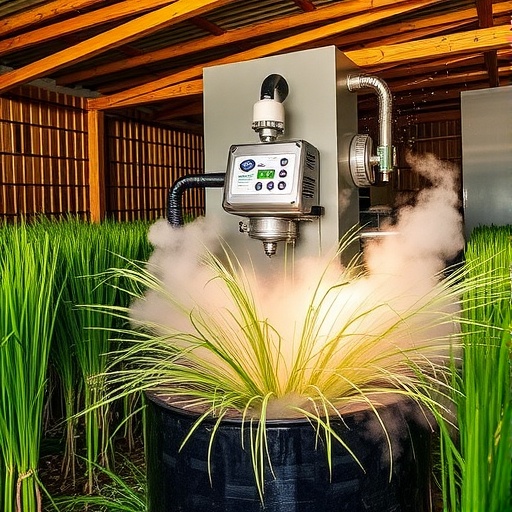
Recent research published in the journal Waste Biomass Valor sheds light on the remarkable influences of steam explosion pretreatment on the composting performance of rice straw. The study, conducted by Zhao, Li, Zhao, and their colleagues, meticulously examines the dynamics of humification, a process pivotal for soil fertility and carbon sequestration. The findings could have profound implications for agricultural practices, particularly in sustainable waste management and soil health enhancement.
At the core of the study lies rice straw, an abundant agricultural byproduct that, if improperly managed, can lead to significant environmental challenges. Traditionally, rice straw has been burned, contributing to atmospheric pollution and waste of potentially valuable organic matter. The research indicates that by employing steam explosion pretreatment, the humification process during composting becomes significantly more efficient, maximizing the conversion of this waste material into valuable compost.
The steam explosion technique used in this study involves subjecting rice straw to high-pressure steam followed by rapid depressurization. This method not only breaks down the complex lignocellulosic structure of the straw but also enhances the availability of nutrients for microbial communities responsible for decomposition. Zhao and colleagues observed that this pretreatment positively influences the chemical and physical properties of the rice straw, making it easier for microorganisms to degrade.
One of the most compelling findings of the study is the measurable increase in the humification rate of treated rice straw compared to untreated counterparts. The researchers rigorously quantified humic substance formation, an indicator of successful humification, highlighting that the steam-exploded samples exhibited a profound enhancement in humic acid yield. This raises intriguing questions about the role of preprocessing in enhancing compost quality, pointing to a promising avenue for improving organic waste recycling strategies.
Microbial community dynamics also played an essential role in the study, as the researchers examined how steam explosion pretreatment influenced the variety and abundance of microorganisms involved in the composting process. Enhanced conditions for microbial growth translated to a more rapid breakdown of organic materials, which is a critical component of successful composting. The researchers reported that the treated samples harbored a greater diversity of microbial taxa, leading to improved metabolic rates and overall compost quality.
Furthermore, the study emphasizes the significant effects of moisture retention and nutrient release during the composting of steam-exploded rice straw. The pretreatment process not only made the straw more digestible for microorganisms but also enhanced its ability to absorb and retain moisture. This characteristic is vital for maintaining optimal conditions for composting and ensuring that the microbial populations thrive, thus accelerating the breakdown process and improving the overall efficacy of compost production.
Another noteworthy aspect of the research is the environmental benefits associated with adopting steam explosion pretreatment as a standard practice in rice straw management. By transforming what was previously considered waste into valuable compost, farmers and agricultural stakeholders can reduce their reliance on chemical fertilizers and promote sustainable agricultural practices. This shift not only helps in mitigating greenhouse gas emissions but also contributes to soil health and resilience, addressing urgent contemporary challenges such as climate change and soil degradation.
As the agricultural sector continues to explore sustainable innovations, findings from Zhao et al.’s research could pave the way for more comprehensive and effective waste management approaches. The steam explosion pretreatment presents an opportunity to convert an environmental liability into a profitable asset, demonstrating the potential for synergy between agricultural productivity and ecologically responsible practices.
The broader implications of this research extend beyond rice straw composting; it raises a fundamental question about how we approach organic waste management on a global scale. With the world grappling with issues surrounding food waste, land degradation, and environmental sustainability, the study emphasizes the importance of exploring innovative solutions to harness the full potential of agricultural byproducts.
Researchers and industry stakeholders are now called upon to assess the viability of integrating steam explosion technology into existing agricultural systems. Investigating the economic feasibility of such interventions and their potential scalability will be crucial for transforming agricultural practice and enhancing resource efficiency. Future research could also investigate the application of this technique to other agricultural waste materials, broadening the impact of steam explosion pretreatment in the realm of sustainable agriculture.
Engaging farmers and policymakers will be critical in disseminating the findings of this study and advocating for legislative support that encourages the adoption of innovative waste management practices. Public awareness campaigns highlighting the benefits of converting waste into compost can foster community collaboration and support for sustainable initiatives.
In conclusion, Zhao et al.’s research provides a compelling argument for re-examining agricultural waste utilization strategies through the lens of steam explosion pretreatment. Their findings not only offer practical implications for improving composting performance but also contribute to a broader dialogue on sustainable agricultural practices. As the world moves towards more resilient and sustainable food systems, studies like these will undoubtedly play a pivotal role in shaping the future of agricultural waste management.
Subject of Research: Effect of Steam Explosion Pretreatment on Rice Straw Humification Performance During Composting
Article Title: Effect of Steam Explosion Pretreatment on Rice Straw Humification Performance During Composting
Article References:
Zhao, X., Li, B., Zhao, C. et al. Effect of Steam Explosion Pretreatment on Rice Straw Humification Performance During Composting.
Waste Biomass Valor (2025). https://doi.org/10.1007/s12649-025-03203-5
Image Credits: AI Generated
DOI: 10.1007/s12649-025-03203-5
Keywords: steam explosion, rice straw, composting, humification, microbial dynamics, sustainable agriculture, waste management.
Tags: carbon sequestration methodsenvironmental benefits of compostinghumification process enhancementlignocellulosic biomass treatmentmicrobial decomposition efficiencynutrient availability in compostingorganic waste management strategiesrice straw compostingsoil fertility improvementsteam explosion pretreatmentsustainable agricultural practiceswaste biomass valorization




